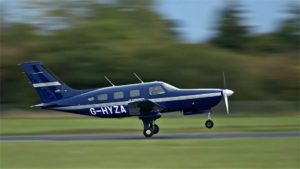 ZeroAvia’s mission to transition the world to zero-emission, hydrogen-fueled flight picked up a significant tailwind today as the startup announced $21.4 million in new funding in a Series A round. Breakthrough Energy Ventures and Ecosystem Integrity Fund led the raise, with follow-on investors Amazon Climate Pledge Fund, Horizons Ventures, Shell Ventures, and Summa Equity. In addition, the company established a partnership with British Airways and received approval for new UK government funding through the ATI Programme to deliver an additional $16.3 million of non-dilutive funding breakthrough 19-seat hydrogen-electric powered aircraft that is market-ready by 2023. Today’s announcement brings the total new funding to $37.7 million and the total funding since inception to $49.7 million.
ZeroAvia’s mission to transition the world to zero-emission, hydrogen-fueled flight picked up a significant tailwind today as the startup announced $21.4 million in new funding in a Series A round. Breakthrough Energy Ventures and Ecosystem Integrity Fund led the raise, with follow-on investors Amazon Climate Pledge Fund, Horizons Ventures, Shell Ventures, and Summa Equity. In addition, the company established a partnership with British Airways and received approval for new UK government funding through the ATI Programme to deliver an additional $16.3 million of non-dilutive funding breakthrough 19-seat hydrogen-electric powered aircraft that is market-ready by 2023. Today’s announcement brings the total new funding to $37.7 million and the total funding since inception to $49.7 million.
The fundraise allows ZeroAvia to accelerate the development of its hydrogen-electric powertrain further. The Series A funds the next phase of the company’s R&D program, which focuses on developing and testing the certification-ready ZA-600 powertrain capable of flying 10-20 seat aircraft up to 500 miles. The investment comes on the heels of the company completing the UK’s first-ever commercial-scale battery-electric flight in June 2020 and the first flight of the largest hydrogen fuel cell aircraft in September 2020 as part of the innovative HyFlyer I project. ZeroAvia expects a long-distance flight of 250 miles in the next three months.
ZeroAvia offers the hydrogen-fueled powertrain technology to replace conventional engines in propeller aircraft resulting in zero-emissions, lower noise, lower fuel and maintenance costs and a total trip cost reduction. By 2026, ZeroAvia intends to realise flights over 500 miles range in aircraft with up to 80 seats, and by 2030 over 1,000-mile flights in aircraft with over 100 seats.
The funding is on the heels of a partnership with British Airways in a project to explore how hydrogen-powered aircraft can play a leading role in the future of sustainable flying. With sustainability of increasing importance at British Airways, the collaboration will embed ZeroAvia in the heart of the airline to work alongside mentors and experts to explore the transformational possibilities of moving from fossil fuels to zero-emission hydrogen to power the airline’s future fleet. The partnership forms part of the International Airlines Group’s industry-leading Hangar 51 accelerator programme.
The Energyst is a stakeholder for Net Zero Week 2021 – find out more here.




While battery/fuel cell flight needs to be developed, it is unlikely that this technology can power long haul flights with large numbers of passengers. The green fossil free technology that can be used to power such existing aircraft is fossil-free hydrocarbon fuel, produced with carbon dioxide captured from the air using the time tried and tested Fischer Tropsch process and green hydrogen and electricity to manufacture fossil-free hydrocarbons.